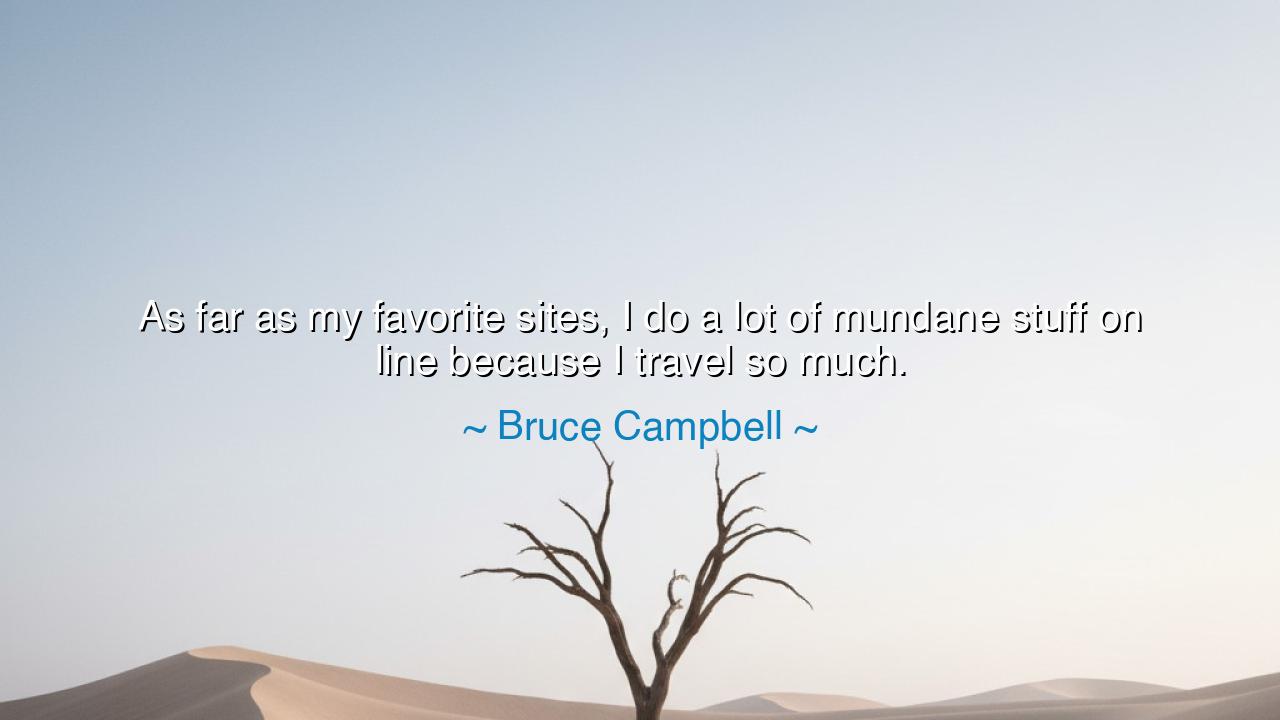
As far as my favorite sites, I do a lot of mundane stuff on line
As far as my favorite sites, I do a lot of mundane stuff on line because I travel so much.






Bruce Campbell once remarked with simplicity and candor: “As far as my favorite sites, I do a lot of mundane stuff online because I travel so much.” At first, this may appear to be a lighthearted observation about habits formed in the digital age. Yet hidden within these words is a profound truth about balance, about the rhythm between the extraordinary and the ordinary, and about the soul’s need for grounding even in the midst of restless movement. For Campbell tells us that even those who roam far, who live amid adventure, must find refuge in the mundane.
The ancients knew this paradox well. The great traveler Herodotus chronicled the marvels of Egypt and Persia, yet his writings are also filled with careful notes of daily life, of food, of customs, of the simple things that gave structure to human existence. In this, Campbell’s confession finds an ancient echo: no matter how far one roams, it is the small routines—the humble tasks—that keep the traveler connected to a sense of normality. The mundane becomes not dullness, but an anchor against the storm of constant change.
Consider, too, the Roman soldiers who marched across continents. They conquered nations, built roads, and raised mighty standards of empire. Yet in their camps they performed the same simple rituals—setting the fire, mending their sandals, cooking their rations. These were “mundane” tasks, yet without them, the vast enterprise of Rome would have collapsed. Campbell’s words remind us of this eternal truth: even the most adventurous lives are upheld by ordinary acts. To dismiss them is folly; to embrace them is wisdom.
There is also in his statement a hidden lesson about adaptation. Modern travel, with its ceaseless motion across airports, hotels, and cities, can disorient the soul. By turning to small and familiar routines—mundane online tasks, simple daily habits—Campbell reclaims a sense of stability. This mirrors the wisdom of sailors on long voyages who carried familiar songs and rituals to remind them of home. For the human spirit, no matter how adventurous, longs for continuity amid change.
History offers us yet another mirror in the life of Marco Polo. He crossed deserts and mountains, reached the palaces of Kublai Khan, and returned to recount marvels unknown to Europe. Yet even in his writings, one sees his attention to small details: the cost of salt, the way merchants kept accounts, the mundane practices of markets. These “ordinary” observations were as vital as the tales of wonders, for they grounded his story in the realities of human life. So too does Campbell remind us that the mundane, far from being a burden, is the foundation of understanding and survival.
The lesson for us is clear: do not despise the ordinary. Even when life calls you to great journeys, to ambitious projects, to paths that lead you far from home, carry with you the grounding of daily rituals. The mundane is not the enemy of the extraordinary—it is its companion, its support, its quiet strength. Without it, even the grandest journey becomes chaos. With it, the traveler can endure the distance and return whole.
Practically, this means cherishing the simple routines in our own lives. When traveling, whether across the world or across the changes of life itself, take time for the small acts that center you—reading, writing, prayer, or even the humble order of checking tasks. These things, though ordinary, are the threads that weave stability into motion. They ensure that the self is not lost amid the whirlwind of change.
Thus, Bruce Campbell’s words, humble though they seem, carry timeless wisdom: life’s grand adventures are only sustainable when balanced by the mundane. The ordinary task, repeated in unfamiliar lands, becomes the traveler’s hearth, the reminder that wherever one roams, one carries a piece of home within. And it is this balance that allows the spirit not only to wander but to endure, not only to see the world but to remain whole while seeing it.






AAdministratorAdministrator
Welcome, honored guests. Please leave a comment, we will respond soon